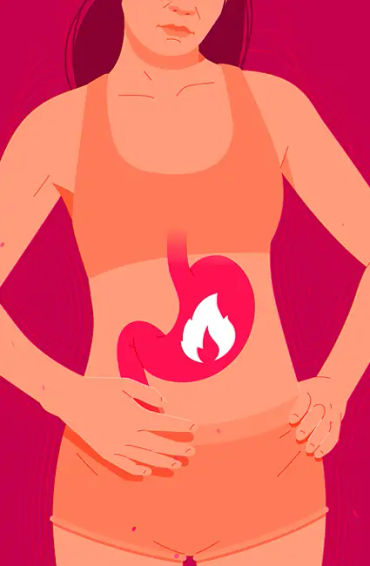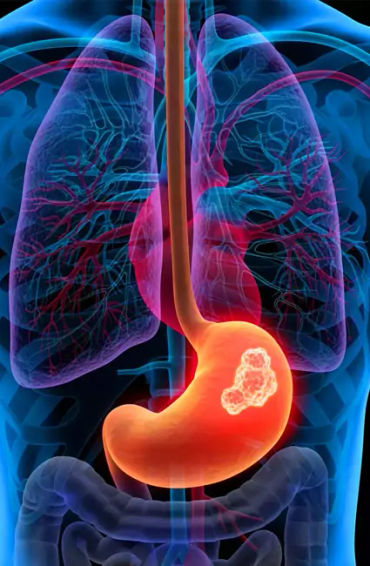
The acid in your stomach is strong enough to burn your skin
So why doesn’t it burn your stomach? Because a thick layer of mucus protects the stomach lining and keeps the acid on the inside, where it’s churned with your food.
When gastric acid sometimes leaks up into the esophagus, which lacks this mucus layer, you know that burning feeling as heartburn. Proton pump inhibitors are drugs you can take to temporarily reduce acid production and allow the esophagus to heal.
When gastric acid sometimes leaks up into the esophagus, which lacks this mucus layer, you know that burning feeling as heartburn. Proton pump inhibitors are drugs you can take to temporarily reduce acid production and allow the esophagus to heal.

Stomach cancer was No. 1 in the 1940s, now it’s No. 8
We’re seeing a lower incidence of gastric cancer these days, partly because our diet contains fewer foods that cause cancer (as refrigeration became widespread, we ate fewer smoked and cured meats).
We now also know that H. pylori can cause stomach cancer, but H. pylori are relatively easy to diagnose and treat.
We now also know that H. pylori can cause stomach cancer, but H. pylori are relatively easy to diagnose and treat.
Prebiotics are better
If you want to boost the bacteria in your bowel, eat a high-fiber diet or take fiber supplements. Fiber is a prebiotic that the bacteria can convert to healthy chemicals for nourishment (that can also help prevent colon cancer).
It’s unlikely that probiotic supplements will help your gut
Your digestive tract contains many beneficial bacteria, but taking a probiotic supplement (live or dried bacteria) is unlikely to give them a boost.
The reason is that these beneficial bacteria are mostly in your large intestine or bowel. Probiotic supplements will rarely survive the acid and churning of the stomach or the detergents and enzymes of the small intestine.
The reason is that these beneficial bacteria are mostly in your large intestine or bowel. Probiotic supplements will rarely survive the acid and churning of the stomach or the detergents and enzymes of the small intestine.
Medication + gut health = frenemies
Sometimes there’s simply no avoiding the need to take meds. But some — antibiotics especially — negatively impact the gut microbiome. So, speak to your doctor if you’re concerned about starting a new prescription
Fecal transplants are ancient medicine made modern
Fecal microbiota transplantation is a method of restoring beneficial bacteria in the colon. The only approved use for fecal transplantation is for someone infected with Clostridiodes difficile (or C. diff) that’s unresponsive to antibiotics. The procedure involves a colonoscopy and transplants feces from a healthy person into a sick person.
In the U.S., doctors completed the first fecal transplants for C. diff infections in 1958. But the practice dates back to 4th century China, where they used a fecal suspension called “yellow soup” to treat digestive problems.
In the U.S., doctors completed the first fecal transplants for C. diff infections in 1958. But the practice dates back to 4th century China, where they used a fecal suspension called “yellow soup” to treat digestive problems.
Cholesterol and fats are completely different
Your liver uses cholesterol to make bile acids, and bile is the only way your body can get rid of excess cholesterol.
Your body also uses cholesterol to make sex hormones, like estrogen and testosterone. If you have liver disease, you’ll have trouble absorbing fats as well as hormonal problems.
But fats are chemically different from cholesterol; the body burns fats for energy. That’s why food labels list fat and cholesterol separately.
Your body also uses cholesterol to make sex hormones, like estrogen and testosterone. If you have liver disease, you’ll have trouble absorbing fats as well as hormonal problems.
But fats are chemically different from cholesterol; the body burns fats for energy. That’s why food labels list fat and cholesterol separately.
Certain bacteria and drugs can cause ulcers
We used to think that stress caused sores in your stomach that doesn’t heal. We now know that prolonged use of nonsteroidal anti-inflammatory drugs (NSAIDs), such as aspirin, ibuprofen (Motrin®, Advil®), or naproxen (Aleve®), can interfere with stomach mucus.
Ulcers result when stomach acid reaches the lining, and when they bleed they can cause pain and even be life-threatening.
A bacterium called Helicobacter pylori, or H. pylori, also can cause ulcers. An Australian doctor proved this by drinking the bacteria himself, and he and his colleague won a Nobel prize for the discovery.
Ulcers result when stomach acid reaches the lining, and when they bleed they can cause pain and even be life-threatening.
A bacterium called Helicobacter pylori, or H. pylori, also can cause ulcers. An Australian doctor proved this by drinking the bacteria himself, and he and his colleague won a Nobel prize for the discovery.

